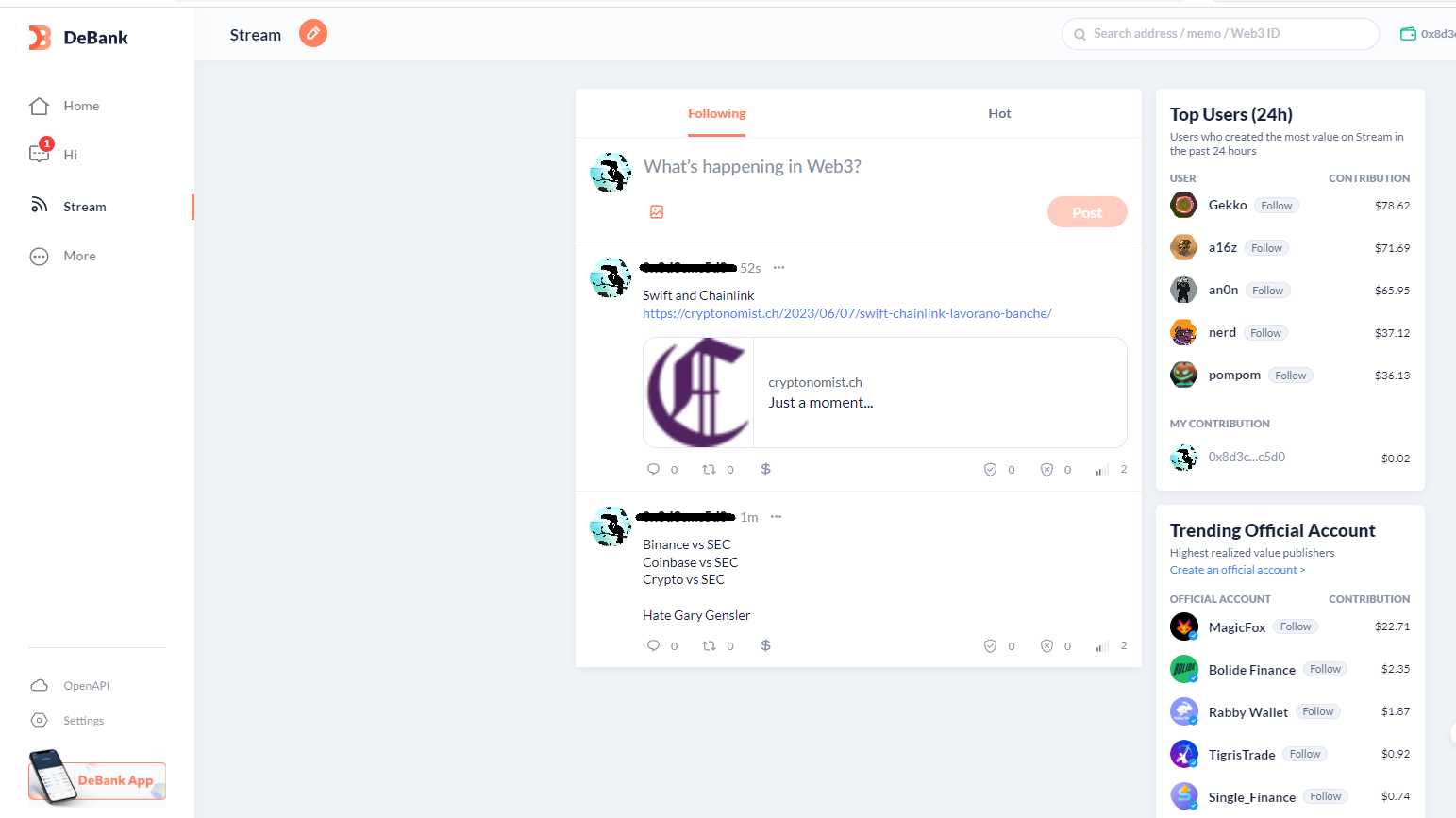How to Become an Expert in Search – Follow Debanks’ Step-by-Step Method
Searching for information on the internet can often feel like navigating through a labyrinth of endless possibilities. With so much data available at our fingertips, it can be overwhelming to find exactly what we’re looking for. Luckily, we have a powerful tool at our disposal – Debanks. This comprehensive search engine is designed to help users master the art of search and effortlessly find the information they need.
Debanks takes a step-by-step approach to search, making it easy for even the most novice users to find what they’re looking for. Whether you’re conducting research for a school project, looking for the perfect recipe for dinner tonight, or trying to find the best vacation destination, Debanks has got you covered.
One of the key features of Debanks is its ability to refine search results. Instead of sifting through pages of irrelevant information, Debanks allows users to specify exactly what they’re looking for. By using specific keywords, filters, and advanced search operators, users can narrow down their search and get precise results. Whether you’re looking for a specific phrase, excluding certain words from your search, or searching within a specific website or domain, Debanks has the tools to help you find exactly what you need.
Another valuable feature of Debanks is its ability to provide personalized search results. By analyzing your search history, location, and preferences, Debanks tailors your search results to match your individual needs and interests. This means that over time, Debanks becomes more intuitive and efficient, saving you time and delivering more relevant information.
So, whether you’re a seasoned internet user or just starting out, Debanks is the ultimate tool for mastering the art of search. With its step-by-step approach, refined search results, and personalized experience, Debanks will revolutionize the way you search for information online. Say goodbye to hours spent scrolling through pages of irrelevant results and say hello to efficient, effective, and tailored searches with Debanks.
Understanding the Basics of Search
In today’s digital age, search engines play a crucial role in helping users find the information they need. Whether you’re looking for the latest news updates, researching a specific topic, or trying to find the best deal on a product, search engines are there to assist you. But have you ever wondered how these search engines work?
When you enter a query into a search engine, such as airdrop debank, it goes through a process called crawling and indexing. First, the search engine sends out crawlers, also known as spiders, to gather information about the content available on the web. These crawlers follow links to different web pages and collect data, such as keywords, HTML tags, and relevant content.
Once the crawlers have collected the necessary information, it is stored in a massive database called an index. This index is what makes search engines so fast and efficient. When you enter a search query, the search engine quickly searches through its index and returns the most relevant results based on various factors, including keyword relevance, page authority, and user location.
| Search Engine | Market Share |
|---|---|
| 92.74% | |
| Bing | 2.34% |
| Yahoo | 1.62% |
| Yandex | 1.54% |
| Others | 1.76% |
It’s important to understand that search engines use complex algorithms to determine the order in which the search results appear. These algorithms take into account various factors to provide the most relevant and reliable information to the user. Factors such as keyword usage, website authority, user experience, and content freshness all play a role in search engine rankings.
By understanding the basics of search engine functionality, you can optimize your website or content to increase visibility and improve your chances of ranking higher in search results. This involves techniques such as keyword research, on-page optimization, link building, and creating high-quality, relevant content.
Whether you’re a business owner, marketer, or simply an internet user, mastering the art of search can greatly benefit you. By leveraging the power of search engines and understanding how they work, you can find the information you need, promote your products or services, and stay ahead of the competition.
Choosing the Right Search Engine

When it comes to searching the web, there are plenty of options available, each with their strengths and weaknesses. Choosing the right search engine is important because it directly impacts the quality and relevance of the search results you receive. Here are some factors to consider when selecting a search engine:
| Factor | Description |
|---|---|
| Search Algorithm | The search algorithm determines how the search engine ranks and organizes the search results. Some search engines prioritize relevance and accuracy, while others may have a different approach. |
| Index Size | The size of the search engine’s index plays a role in determining the scope and depth of the search results. Larger indexes generally mean more comprehensive results, but they can also impact the speed of the search. |
| User Interface | The user interface of a search engine can greatly impact the overall search experience. Factors like simplicity, accessibility, and customization options should be considered based on personal preference. |
| Privacy | Privacy concerns have become increasingly important in recent years. Some search engines prioritize user privacy and do not track user data, while others may collect and use personal information for various purposes. |
| Additional Features | Many search engines offer additional features beyond basic web search, such as image search, news search, or advanced filtering options. Considering the specific features you need can help narrow down your search engine choices. |
It’s important to note that no search engine is perfect for everyone, and your choice may vary depending on your specific needs and preferences. Experimenting with different search engines and evaluating their performance can help you find the one that works best for you.
Effectively Using Keywords

Keywords play a crucial role in search engine optimization (SEO) and can make or break the success of your website. When used effectively, keywords can improve your website’s visibility and drive organic traffic. In this section, we will explore some strategies to effectively use keywords in your content.
1. Conduct thorough keyword research
Before you start using keywords, it’s important to conduct thorough keyword research. This involves identifying the most relevant and high-volume keywords for your industry or niche. There are various tools available that can help you with keyword research, such as Google Keyword Planner, SEMrush, and Moz Keyword Explorer. By identifying the right keywords, you can tailor your content to match the search intent of your target audience.
2. Use keywords strategically in your content

Once you have identified the relevant keywords, it’s important to strategically use them in your content. Here are some tips to effectively use keywords in your content:
| i. Include keywords in your title and meta description | Make sure to include your primary keyword in the title and meta description of your page. This helps search engines understand the relevance of your page to a particular query. |
| ii. Incorporate keywords in your headings and subheadings | Using keywords in your headings and subheadings not only helps with SEO but also improves the readability and structure of your content. |
| iii. Sprinkle keywords naturally throughout your content | Avoid keyword stuffing, but make sure to naturally sprinkle your keywords throughout your content. This helps search engines understand the context and relevance of your content. |
| iv. Optimize your images with keywords | Include descriptive keywords in the alt tags and file names of your images. This can help your images rank in image search results. |
By strategically using keywords in your content, you can improve your chances of ranking higher in search engine results pages (SERPs).
Remember, the key is to use keywords naturally and provide valuable content for your audience. Balance is key to effective keyword usage.
Optimizing Your Website for Search

When it comes to search engine optimization (SEO), your website plays a crucial role in determining your visibility and ranking on search engine results pages (SERPs). By optimizing your website, you can improve its chances of appearing higher on SERPs and attracting more organic traffic. Here are some key steps you can take to optimize your website for search:
1. Conduct Keyword Research
Keyword research helps you understand the search terms and phrases that your target audience is using to find businesses like yours. By identifying relevant keywords with high search volume and low competition, you can optimize your website content to rank higher for those keywords.
2. Optimize On-Page Elements

On-page optimization involves optimizing various elements on your website to make it more search engine-friendly. This includes optimizing your page titles, meta descriptions, header tags, URL structure, and internal linking. Make sure to include your target keywords in these elements to improve your website’s relevancy to search queries.
3. Create High-Quality Content

High-quality and relevant content is crucial for both user engagement and search engine optimization. Create informative and engaging content that addresses the needs and interests of your target audience. Incorporate your target keywords naturally into your content and ensure that it is properly optimized for readability and mobile devices.
4. Improve Website Speed and Performance

Website speed is a key factor in user experience and search engine rankings. Optimize your website for faster loading times by compressing images, minifying CSS and JavaScript files, and enabling browser caching. Conduct regular performance tests to identify and fix any issues that might be slowing down your website.
5. Build High-Quality Backlinks
Backlinks are an important off-page optimization factor. They serve as “votes” of confidence from other websites, indicating to search engines that your website is trustworthy and authoritative. Focus on building high-quality backlinks from reputable and relevant websites through strategies such as guest blogging, influencer outreach, and content promotion.
Optimizing your website for search requires a combination of technical and content-related strategies. By following these steps, you can enhance your website’s visibility and attract more organic traffic, helping you achieve your business goals.
Creating High-Quality Content
When it comes to search engine optimization (SEO), one of the most important factors is creating high-quality content. Search engines like Google value websites that provide valuable and relevant information to users. In order to improve your website’s search rankings, it is essential to have content that is well-written, informative, and engaging.
Here are some tips to help you create high-quality content:
1. Understand your target audience: Before you start creating content, it is important to understand who your target audience is. This will help you determine what type of content they are looking for and how you can provide value to them. Conduct market research and create buyer personas to get a better understanding of your audience’s needs and preferences.
2. Conduct keyword research: Keyword research is an essential part of content creation. By finding relevant keywords that are frequently searched for by your target audience, you can optimize your content to rank higher in search engine results. Use keyword research tools to identify popular keywords and incorporate them into your content in a natural and meaningful way.
3. Write for humans, not search engines: While it is important to optimize your content for search engines, remember that your ultimate goal is to provide value to your readers. Avoid keyword stuffing and focus on creating content that is informative, engaging, and easy to read. Write in a conversational tone and use headings, bullet points, and subheadings to break up your content and make it more readable.
4. Provide unique and original content: Search engines prioritize unique and original content. Avoid duplicating content from other websites as this can negatively impact your search rankings. Instead, focus on creating content that is unique to your website and offers a fresh perspective or new insights on a particular topic.
5. Update your content regularly: To maintain a high search ranking, it is important to regularly update your content. This shows search engines that your website is active and provides up-to-date information to users. Regularly review and update your existing content to ensure its accuracy and relevance.
By following these tips, you can create high-quality content that not only ranks well in search engine results but also provides value to your target audience. Remember, creating high-quality content is an ongoing process, so continue to refine and optimize your content over time.
Building Quality Backlinks

Building quality backlinks is essential for improving your website’s search engine rankings and driving organic traffic. Backlinks are links from other websites that point back to your site, and they are considered a vote of confidence from other sites. Here is a step-by-step approach to building high-quality backlinks:
- Create compelling and valuable content: The first step to building quality backlinks is creating content that is valuable, informative, and compelling. When your content is valuable, other websites are more likely to link back to it.
- Guest blogging: One effective way to build backlinks is by guest blogging on other reputable websites in your industry. By publishing guest posts, you can showcase your expertise and gain backlinks from trusted sources.
- Broken link building: Another strategy is to find broken links on other websites and offer your content as a replacement. This approach involves reaching out to website owners, notifying them about the broken link, and suggesting your content as an alternative.
- Social media promotion: Utilize social media platforms to promote your content and encourage other websites and bloggers to link to your site. Engage with your audience, share valuable content, and build relationships that can lead to backlinks.
- Collaborate with influencers: Identify influencers in your industry and reach out to collaborate on content. By doing so, you can tap into their audience and gain backlinks from their website or social media profiles.
- Submit your website to relevant directories: Submitting your website to reputable directories can help build backlinks and improve your site’s visibility. Choose directories that are relevant to your industry and have a good reputation.
- Monitor and analyze your backlinks: Regularly monitor your backlinks to ensure they are of high quality and coming from authoritative sources. Use tools like Google Search Console and SEO analytics tools to analyze the performance of your backlink profile.
Remember, building quality backlinks takes time and effort, but the rewards can be significant. By following these steps and consistently working to build a strong backlink profile, you can improve your website’s search engine rankings and drive more organic traffic.
Using Social Media for Search
Social media platforms have become powerful tools for conducting online searches. With billions of users and constantly updated content, social media offers a wealth of information that can be utilized in various search scenarios. Here are some tips on how to leverage social media for effective search results:
1. Utilize Hashtags: Hashtags are used to categorize content on social media platforms. By using relevant hashtags in your search queries, you can narrow down your search results and find specific information or topics faster.
2. Follow Influencers: Influencers are individuals who have a large following and are considered experts in their respective fields. By following influencers related to your search topic, you can stay updated on the latest news and trends in that area.
3. Join Relevant Groups: Many social media platforms have groups or communities that focus on specific topics or interests. By joining these groups, you can connect with like-minded individuals and get insider information on your search topic.
4. Engage in Discussions: Engaging in discussions or commenting on relevant posts can be a great way to find answers or additional resources related to your search. Ask questions, contribute to the conversation, and learn from others’ experiences.
5. Explore Trending Topics: Social media platforms often highlight trending topics or hashtags. By exploring these trends, you can discover popular conversations and relevant content related to your search.
6. Use Advanced Search Features: Social media platforms offer advanced search features that allow you to filter search results based on different criteria such as location, date, or specific user-generated content. Take advantage of these features to find more targeted information.
Remember, while social media can be a valuable resource for search, it’s important to critically evaluate and verify the information you find. Not everything shared on social media is accurate or reliable, so always cross-reference with other reputable sources.
Monitoring and Analyzing Search Results

Monitoring and analyzing search results is an essential part of mastering the art of search. By keeping a close eye on the performance and relevance of your search results, you can quickly identify any issues or areas for improvement.
There are several key metrics and techniques that can help you monitor and analyze your search results effectively. One important metric is click-through rate (CTR), which measures the percentage of users who click on a specific search result. A higher CTR indicates that your search result is more relevant and appealing to users.
Another metric to consider is bounce rate, which measures the percentage of users who leave your website after viewing a search result. A higher bounce rate could indicate that your search result is not meeting the expectations of users or that your website’s content needs improvement.
In addition to these metrics, it is also important to track the conversion rate of your search results. This measures the percentage of users who complete a desired action, such as making a purchase or filling out a form, after clicking on a search result. A higher conversion rate indicates that your search result is not only attracting users but also convincing them to take the desired action.
To effectively monitor and analyze your search results, it is crucial to have access to tools and analytics platforms that provide detailed insights. These tools can help you identify patterns, trends, and areas for improvement in your search results. They can also provide valuable information about user behavior and preferences, allowing you to make data-driven decisions to optimize your search strategy.
Lastly, it is essential to regularly review and analyze your search results to identify any changes or trends. By staying updated with the latest industry developments and user preferences, you can ensure that your search results remain relevant and effective.
In conclusion, monitoring and analyzing search results is a crucial step in mastering the art of search. By closely monitoring important metrics and using analytics tools, you can gain valuable insights and continually improve the performance and relevance of your search results.
Understanding Search Algorithms

When using a search engine, have you ever wondered how it knows which results to display? This is where search algorithms come into play. Search algorithms are the complex mathematical formulas and techniques used by search engines to determine the relevance and ranking of web pages in response to a user’s query.
There are several types of search algorithms, each with its own approach and factors it considers. One of the most common algorithms is the PageRank algorithm, developed by Google. It uses a combination of factors such as the number and quality of links pointing to a page to determine its importance and relevance.
Another popular algorithm is the TF-IDF (Term Frequency-Inverse Document Frequency) algorithm. It determines the relevance of a page by analyzing the frequency of a search term within a page, as well as its rarity within the entire document collection.
Other search algorithms focus on factors such as user behavior, social signals, and contextual relevance. For example, the RankBrain algorithm, also developed by Google, uses artificial intelligence and machine learning to understand user intent and deliver more relevant search results.
Understanding search algorithms is crucial for search engine optimization (SEO) professionals and website owners. By knowing how these algorithms work, they can optimize their content to improve their visibility and ranking in search engine results.
However, it’s important to note that search algorithms are constantly evolving. Search engines regularly update and refine their algorithms to provide users with the best possible search experience. This means that SEO techniques that worked in the past may not be as effective today.
In conclusion, search algorithms are the backbone of search engines, determining the relevance and ranking of web pages. Understanding them is essential for anyone looking to improve their online presence and visibility.
Mastering Local Search
When it comes to search engine optimization (SEO), local search is a crucial aspect that can’t be overlooked. Local search optimization is the process of optimizing your website and online presence to attract more local customers.
The Importance of Local Search

With the rise of mobile devices and the increasing dependence on search engines for information, local search has become more important than ever. When users search for products or services, they often include location-specific keywords, such as city names or zip codes, to find businesses near them. Therefore, optimizing your website for local search can greatly improve your chances of being found by potential customers in your area.
Local SEO involves a combination of on-page and off-page strategies to improve your website’s visibility in local search results. This includes optimizing your Google My Business profile, building local citations, getting positive customer reviews, and creating location-specific content on your website.
Optimizing Your Google My Business Profile
One of the first steps in mastering local search is to claim and optimize your Google My Business (GMB) profile. GMB is a powerful tool that allows businesses to manage their online presence on Google, including their business location, contact information, reviews, and more.
When optimizing your GMB profile, make sure to provide accurate and up-to-date information, such as your business name, address, phone number, and website. Also, include high-quality photos, select relevant categories, and encourage customers to leave reviews. The more complete and accurate your GMB profile is, the more likely it is to appear in local search results.
Tip: Regularly update your GMB profile with new photos, posts, and offers to keep it fresh and engaging.
Building Local Citations
Another essential aspect of local search optimization is building local citations. A local citation is any online mention of your business name, address, and phone number (NAP). These citations can appear on various local directories, review websites, social media platforms, and other online platforms.
When building local citations, ensure that your NAP information is consistent across all platforms. Inaccurate or inconsistent citations can confuse search engines and lead to lower rankings. Also, focus on getting listed on top-quality directories and websites that are relevant to your industry or location.
Tip: Monitor and update your local citations regularly to ensure their accuracy and consistency.
By mastering local search and implementing effective SEO strategies, you can attract more local customers and boost your business’s online visibility. Remember to stay updated on the latest local search trends and adapt your strategies accordingly to stay ahead of the competition.
Staying Up-to-Date with Search Trends

As a search enthusiast, it’s crucial to stay up-to-date with the latest search trends to remain competitive and effectively optimize your website. Below are some strategies to help you keep track of search trends:
- Follow industry blogs and news sites: Regularly visit reputable industry blogs and news sites that cover search engine updates and trends. These sources often provide valuable insights and analysis on the latest changes in search algorithms and ranking factors.
- Engage in online communities and forums: Join online communities and forums where search professionals and enthusiasts discuss current trends and issues. Participating in these communities can help you learn from others, share your experiences, and get valuable advice.
- Subscribe to newsletters and email updates: Sign up for newsletters and email updates from trusted sources in the search industry. These subscriptions can provide you with regular updates on new search trends, algorithm changes, and best practices.
- Attend industry conferences and webinars: Attend industry conferences and webinars related to search marketing and optimization. These events often feature expert speakers who share their knowledge and insights on the latest trends in search.
- Monitor search engine announcements: Keep an eye on official announcements and updates from major search engines like Google, Bing, and Yahoo. These announcements can provide important information about algorithm changes, new features, and best practices that can impact your search rankings.
- Utilize search trend tools and analytics: Take advantage of tools and analytics platforms that track search trends and provide valuable data. These tools can help you identify emerging keywords, popular topics, and user search behavior, enabling you to optimize your website and content accordingly.
By staying up-to-date with search trends, you can ensure that your website remains competitive and effectively reaches your target audience. Continuously adapting your search optimization strategies based on the latest trends will also help you stay ahead of the competition and improve your search engine rankings.
Utilizing Paid Search Advertising
One effective way to enhance your search strategy is by utilizing paid search advertising. With paid search advertising, also known as pay-per-click (PPC) advertising, you can target specific keywords and display ads that are relevant to users searching for those keywords.
By using paid search advertising, you can increase your brand visibility and attract more qualified leads to your website. It allows you to reach a wider audience and drive targeted traffic to your site.
One of the key advantages of paid search advertising is that you only pay for the ads that generate clicks. This means you can control your advertising budget and optimize your campaign to get the best return on investment (ROI).
To effectively utilize paid search advertising, you need to conduct thorough keyword research. Identify the keywords that are relevant to your business and have a high search volume. This will help you create targeted ads that appear when users search for those specific keywords.
Once you have identified your target keywords, you can create compelling ad copy that entices users to click on your ads. Make sure your ads are relevant to the user’s search query and include a compelling call-to-action to encourage users to visit your website.
In addition to creating targeted ads, you should also optimize your landing pages to ensure a seamless user experience. Make sure your landing pages are relevant to the ad and have clear and concise information about your products or services.
Finally, monitor and analyze the performance of your paid search advertising campaigns. Use analytics tools to track the number of clicks, impressions, and conversions generated by your ads. This data will help you identify areas of improvement and make informed decisions to optimize your campaign.
| Benefits of Utilizing Paid Search Advertising | Tips for Effective Paid Search Advertising |
|---|---|
|
|
In conclusion, paid search advertising can be a powerful tool to enhance your search strategy. By targeting specific keywords and creating compelling ads, you can attract more qualified leads and increase your brand visibility. However, it’s important to conduct thorough keyword research, create relevant ad copy, optimize your landing pages, and monitor and analyze your campaign performance to get the best results.
Maintaining a Search-Friendly Website
Once you have optimized your website for search engines, it’s important to continue maintaining a search-friendly website to ensure high visibility and rankings in search results. Here are some key steps to follow:
Regularly Update Content

Search engines favor websites that update their content frequently. Keep your website fresh by regularly adding new and relevant content. This not only signals to search engines that your website is active, but it also provides more opportunities to target keywords and attract organic traffic.
Optimize Metadata
Metadata, including titles and descriptions, plays a significant role in search engine rankings. Make sure to optimize these elements for each page on your website. Use relevant keywords and provide accurate and compelling descriptions to encourage users to click on your website in search results. Remember to keep titles and descriptions unique for each page.
Improve Website Speed

Website speed is an essential factor that affects both user experience and search engine rankings. Slow-loading websites can discourage users from engaging with your content and affect your rankings negatively. Regularly monitor and optimize your website’s loading speed to ensure a smooth and seamless user experience.
Optimize for Mobile
With the increasing number of users accessing the internet through mobile devices, it’s crucial to optimize your website for mobile devices. Ensure your website is mobile-friendly and provides a seamless user experience on smartphones and tablets. Mobile optimization is not only important for user experience but also for search engine rankings, as search engines prioritize mobile-friendly websites.
Fix Broken Links
Broken links can negatively impact your website’s search engine rankings and user experience. Regularly check for broken links and fix them promptly. You can use online tools or plugins to scan your website for broken links and easily identify and fix them.
By following these steps and regularly maintaining your website, you can ensure a search-friendly website that attracts organic traffic and improves your rankings in search engine results.
Taking your Search Skills to the Next Level
Once you have mastered the basics of search, it’s time to take your skills to the next level. Here are some tips and techniques to help you improve your search abilities and become a search engine ninja.
1. Use Advanced Search Operators
One of the first steps to leveling up your search skills is to become familiar with advanced search operators. These operators can help you refine your search queries and find exactly what you’re looking for. Some common operators include:
- site: Search within a specific website
- filetype: Search for specific file types (e.g., PDF, DOC)
- – Exclude specific keywords
- ” “ Search for exact phrases
By using these operators, you can narrow down your search results and find the most relevant information quickly and efficiently.
2. Deepen your Keyword Research
Keyword research is a crucial skill for effective searching. By expanding your keyword research and using a variety of related terms and synonyms, you can uncover hidden gems of information that might have otherwise gone unnoticed. This not only enhances the depth of your search results but also helps you discover new angles and perspectives on your topic.
Consider using online keyword research tools and brainstorming sessions to expand your keyword vocabulary and uncover more valuable search results.
Pro tip: Don’t forget to use long-tail keywords, which are longer and more specific phrases that often yield more targeted and relevant search results.
3. Refine your Search Queries with Boolean Logic
Boolean logic allows you to combine search terms and operators to create powerful queries. By using operators such as “AND,” “OR,” and “NOT,” you can refine your search queries and get more accurate results. For example, using “AND” between two keywords will tell the search engine to find web pages that contain both keywords, while using “NOT” before a keyword will exclude pages that contain that keyword.
Understanding and using Boolean operators effectively can significantly enhance the precision and relevance of your search results.
With these tips and techniques in your arsenal, you are well on your way to becoming a search engine master. Keep practicing, exploring new search strategies, and staying up-to-date with the latest advancements in search technology, and soon you’ll be able to find information faster and more effectively than ever before.
FAQ:,
What is Debanks?
Debanks is a platform that helps users master the art of search and improve their search skills.
How can Debanks help me improve my search skills?
Debanks provides a step-by-step approach to mastering the art of search, teaching users how to effectively use search engines, search operators, and advanced search techniques.
What are some examples of advanced search techniques taught by Debanks?
Debanks teaches advanced search techniques such as using quotation marks to search for exact phrases, using the site: operator to search within a specific website, and using the filetype: operator to search for specific file types.




